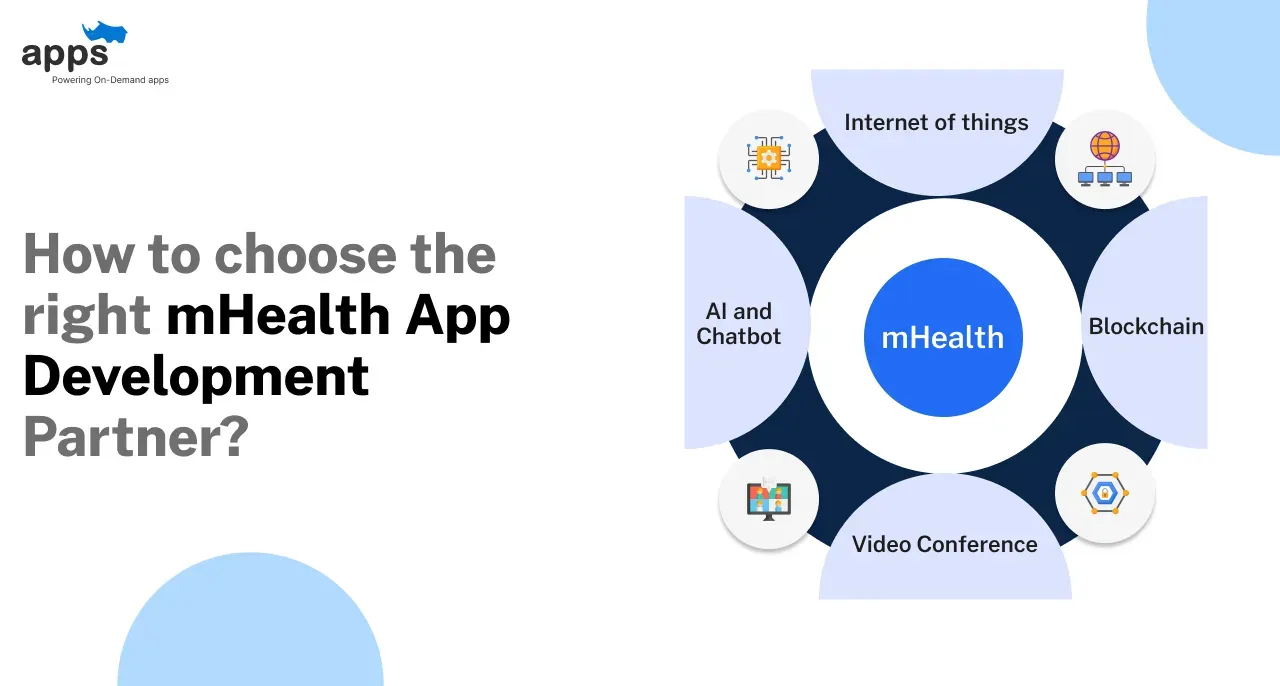- Introduction
- Factors to Consider when Selecting an mHealth App Development Partner
- Evaluating Technical Capabilities of Potential Development Partners
- Assessing Communication and Project Management
- Pricing Models and Budget Considerations
- Conclusion
- Frequently Asked Questions (FAQs)
Table of Contents
How to choose the right mHealth App Development Partner?

Introduction
The rise of Mobile health or mHealth has brought drastic changes in the world of healthcare. mHealth app development has been successful in providing exclusive healthcare services to their patients in the most convenient and seamless ways.
To make this happen, mHealth offers intricate features and functionalities that healthcare providers can utilize accordingly. mHealth app development services range from personalized solutions to active engagement with patients, leading to positive outcomes.
For healthcare professionals and individuals hoping to introduce mHealth apps in their medical organizations, the need to integrate with the mHealth app development company comes first.
This decision must be undertaken after thorough research and analysis because everything from the success of your mHealth application directly depends on the app development partner.
Conducting such research can be a huge challenge. Therefore, the factors that must be considered when selecting a mHealth app development company have been mentioned below.
Every factor that governs the choice is explained in detail, along with proper guidelines on how to put it to use in real-life situations.
Factors to Consider when Selecting an mHealth App Development Partner
When it comes to selecting a mHealth app development company, several factors must be considered.
Firstly, the mHealth app developer must have considerable knowledge and experience in the healthcare industry.
Their knowledge should cover topics like recent medical advancements and current trends that have been in demand across the medical realm. Adequate knowledge is of great help during mHealth app development.
Take AppsRhino, for example. Its significant years of experience and knowledge contribute to its mHealth app development solutions. It has been the ideal choice for healthcare organizations.
One primary reason is AppsRhino's ability to create user-friendly and customized outcomes.
Apart from a deep understanding of the medical industry, the application developer must generate mHealth app development solutions that comply with medical regulations and standards.
Adherence to medical regulations, accuracy, and patient safety.
The app development partner should also provide trusted data privacy and security measures. mHealth app development must be done in such a way that it would safeguard the sensitive data and medical information of both patients and healthcare providers.
For this, the app development partner must integrate with the best security frameworks the market has to offer.
Another effective way to choose the right app development partner is to review their previous customer reviews and similar case studies.
One can even evaluate their portfolio to understand their approach towards mHealth app development better. It is essential to choose a partner who has demonstrated expertise in mHealth app development so that they can easily bring your vision to life.
Evaluating Technical Capabilities of Potential Development Partners
When evaluating the technical capabilities of potential development partners, several key factors must be considered.
Assessment of technical capabilities:

To select the right mHealth development partner, assessing the technical capabilities of the team that would be responsible for mHealth app development.
The development team must be able to operate any given framework that the medical organization thinks would work best for their mHealth application. This level of expertise makes the app development process much easier and smoother.
Integration of third-party services and APIs:

The app development partner must be able to integrate third-party services and APIs during mHealth application development. In the healthcare landscape, it is very important for your mHealth application to provide the necessary functionality that these services bring.
Their team of skilled developers must understand how to combine these features in your application and provide the ultimate sense and convenience to your mHealth app.
Scalability:

Scalability is another crucial factor to evaluate. Successful mHealth app development would ensure that your application can handle a large number of users and data, and the mHealth development company should have the ability to design and build a system that can handle this potential growth.
This involves considering factors such as server infrastructure, database design, and caching mechanisms to ensure that the app can scale effectively.
Quality assurance checks and testing:

It is important to consider the mHealth development company’s quality assurance procedures and testing methodologies. After a robust testing process, the mHealth app development process can be deemed successful.
A robust testing process ensures that the app is functioning as intended and to identify any potential issues or bugs.
The mHealth development company should offer mHealth app development solutions along with a well-defined testing process in place, including both manual and automated testing, to ensure the highest possible level of quality and reliability for the app.
Assessing Communication and Project Management

Several key factors must be considered when assessing potential development partners' communication and project management skills.
Firstly, clear communication channels and regular updates are essential for a successful mHealth app development.
It is important to ensure that the development team has a clear communication strategy in place, such as regular meetings or status updates, to keep all stakeholders informed about the project's progress.
This helps avoid misunderstandings or delays and ensures everyone is on the same page.
Drawing direct examples from AppsRhino, mHealth application development begins by assigning each project to a project manager.
This project manager is the point of contact between the development team and stakeholders.
The project manager makes sure that there is active communication and collaboration between the two parties at all times and mHealth app development is done smoothly, keeping all the points of the stakeholders in mind.
Additionally, strong project management skills and adherence to timelines are critical. mHealth app development company should have a proven track record of successfully managing and delivering projects on time.
Their earlier mHealth application development services must have a well-defined project management process in place, which includes task breakdown, milestones, dependencies, and clear timelines.
Strong project management skills reduce the chances of unexpected delays and enable better coordination among team members.
Pricing Models and Budget Considerations

While reviewing the extensive list of app development companies available in the healthcare industry, healthcare organizations must also monitor their pricing models and other terms and conditions to determine whether they fit their respective budget allocations.
Generally, mHealth app developers offer three pricing models: fixed-price, time and materials, and dedicated teams.
AppsRhino understands that generic pricing models might not be accessible for all clients and stakeholders. Therefore, AppsRhino provides mHealth app development services in different pricing models, each with its own set of features and functionalities.
Healthcare organizations can look into the extensive list of mHealth app development services offered by AppsRhino and choose the one that best fits their needs.
With a fixed-priced model, one needs to handle the expense of the entire project, including its expected features and outcomes.
For a more flexible and customized option, users can choose the Time and materials model. In this model, one pays for mHealth app development based on the actual time and resources spent on the project.
Suggested Reading : 5 Ways mHealth App Development Changes Your Practice
The developed project is open to upgrading and any sort of change will require the organization to incur extra charges for it. Like the fixed-priced model, it is difficult to evaluate the total cost of production in this model.
For users with a fixed budget, this might be a little challenging to invest in.
Lastly, one can recruit a team of proficient developers and get their mHealth app development done. For this, there is a need for a dedicated team model.
The users get updates on the project's overall progress and even have the power to include any sort of changes wherever they feel like. However, it may require more client involvement and can be costlier compared to other models.
While selecting the pricing model that best suits their needs, healthcare organizations should also evaluate the pros and cons of every pricing model separately.
This evaluation will help them make a decision while keeping the desired level of quality for your mobile app in mind.
Conclusion
In conclusion, when evaluating potential development partners for mHealth app development, it is essential to consider a wide range of factors.
These factors include technical capabilities, communication, and project management skills, as well as pricing models and budget considerations. Different mHealth app development companies have different mHealth app development services in store for its clients.
Evaluating the technical capabilities ensures that the development team is proficient in the necessary frameworks and has experience integrating healthcare APIs and systems, considering scalability and quality assurance procedures.
This ensures that the development partner has the necessary expertise to deliver a high-quality and successful mHealth app.
Suggested Reading : Where to Find The Right mHealth App Development Services
Frequently Asked Questions (FAQs)
How do I determine the technical expertise of a potential mHealth app development partner?
When assessing technical expertise, consider factors such as the development team's experience with mHealth app development, their knowledge of relevant programming languages and frameworks, and their ability to integrate with healthcare systems and APIs.
What should I look for in terms of communication and project management skills?
It is crucial to choose a development partner with clear communication channels and a proactive approach to keeping stakeholders informed.
Look for evidence of regular updates, transparent project management processes, and the ability to adapt and accommodate changes during the development process.
How can I assess the quality of previous projects delivered by a development partner?
Ask for case studies or references to evaluate the quality of previous projects. Additionally, request access to live apps developed by the partner to assess their user experience, functionality, and performance.
This allows you to see firsthand the quality of their work.
How can I ensure that the development partner can handle the scalability requirements of my mHealth app?
Discuss scalability requirements with the development partner and inquire about their experience with scaling apps.
Ask about their infrastructure, load testing procedures, and any previous experience handling a large user base to gauge their capability in handling scalability.
What pricing models are commonly used for mHealth app development, and which one should I choose?
Common pricing models include fixed-price, time and materials, and dedicated team. Each has its advantages and considerations.
Evaluate your project scope, flexibility requirements, and budget constraints to determine the most suitable pricing model for your needs.
How important is it to consider data security and HIPAA compliance when choosing a development partner?
Data security is of utmost importance in mHealth app development, particularly when dealing with sensitive patient information.
Ensure that the development partner has a strong understanding of data security measures and adherence to relevant regulations, such as HIPAA compliance, to protect user data and maintain confidentiality.
Table of Contents
- Introduction
- Factors to Consider when Selecting an mHealth App Development Partner
- Evaluating Technical Capabilities of Potential Development Partners
- Assessing Communication and Project Management
- Pricing Models and Budget Considerations
- Conclusion
- Frequently Asked Questions (FAQs)


